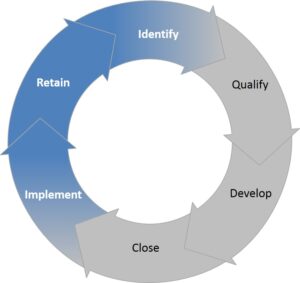Delivering value to customers … after the sale

At the 2015 Chief Sales Executive Forum, leadership from all industries will assemble in search of the answer to one key question: how can my sales team deliver value to customers?
Now more than ever, sales teams are being asked to deliver value to customers. What used to be the responsibility of the product, service or delivery team, is now being asked of the sales team … and why not? Sales and account management teams likely have more intimate knowledge of customers and their needs than any other resource within an organization. For many businesses, sales teams serve as the only face or point-of-interaction that a customer will ever have. Given this fact, it seems only logical for sales to assist with delivering value and ultimately satisfying, retaining and growing the existing customer base.
So are we saying that front-line sellers should now own solution development, delivery and end-to-end customer service after signing a new customer? No, of course not. We still need to make sure that sellers have ample hunting, farming and general selling time. Instead, we are acknowledging a growing trend in coverage design that asks the sales organization to play a larger role in value delivery via post-sale specialists.
Common Post-Sale Specialists
- Adoption Manager (High-Tech)
- Client Consultant (Business Services)
- Clinical Care Specialist (Medical)
- Customer Advocates (High-Tech)
- Customer Success Manager (Cloud)
Traditionally, organizations have focused their sales resources on “closing deals” (be it net-new, upsell or cross-sell) by offloading any renewal or customer support-related activities to lower cost, lower skilled functions outside of the sales organization. However, in recent years, we have seen a rise in the number of post-sales specialists that shift many of these responsibilities back to the sales organization.
Role and Responsibilities
Although job titles and detailed activities will differ by organization, all post-sale specialists aim to achieve the same goal: become indispensable to customers. These specialists typically serve five primary functions:
- Value realization – ensure customers receive the full benefit of their purchases
- Customer adoption – ensure customers embrace and implement offering
- Enhanced utilization – drive and extend usage within customer organization
- Ongoing customer education – provide insights beyond the purchase
- Competitive threat mitigation – monitor and deter entry of competitive offerings
The hope is that by becoming ingrained in their accounts, specialists can reduce customer churn, increase retention rates and drive incremental business. This is achieved by providing proactive support and functioning as a consultant, not a reactive customer service representative or selling-oriented account manager.
 Common post-sale specialist activities include:
Common post-sale specialist activities include:
- Implementation support
- Customer onboarding
- New user and product training
- Monitor and drive product utilization
- Share best practices and insights
- Proactive customer support
- Uncover upsell and cross-sell opportunities
For example, in high-tech and cloud, Customer Success Managers will onboard new users, monitor login activity and promote usage of under-utilized product features … all without closing a single deal. In the medical field, Clinical Care Specialists will provide new product training to hospital staff, present industry research, perform demonstrations and work with their sales colleagues to create clinical solutions … all without closing a deal.
Not Farming but Fostering Accounts
It is important to recognize that while many of the responsibilities listed above resemble the responsibilities of “farming” account managers, the two positions function in very different ways. Farmers’ primary focus is to drive growth by identifying and closing net-new sales opportunities within their assigned accounts. Farmers think: sales first and account maintenance/service second. This is a sharp contrast to post-sale specialists, whose focus is to foster and maximize the value that clients receive from their existing purchases. Post-sale specialists think: quality and utilization first, retention and growth second. Many of the key differences between these positions are shown below:

Closing Thoughts
Even with the recent rise of post-sale specialists, we should never expect or want them to replace the farmer, customer service and delivery functions of today. In many instances, post-sales specialists are complimentary to these important functions. The primary advantage that post-sales specialists have over these roles is their more personal connection with accounts and end-users.
Learn more about how the Alexander Group has helped our clients consider the deployment of post-sales specialists through our sales coverage practice.